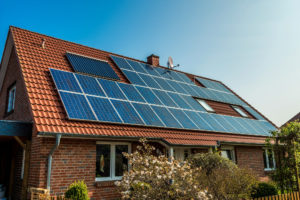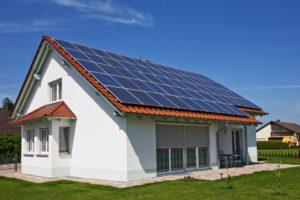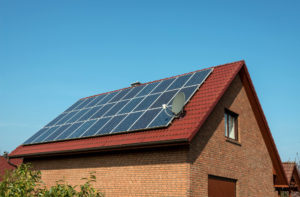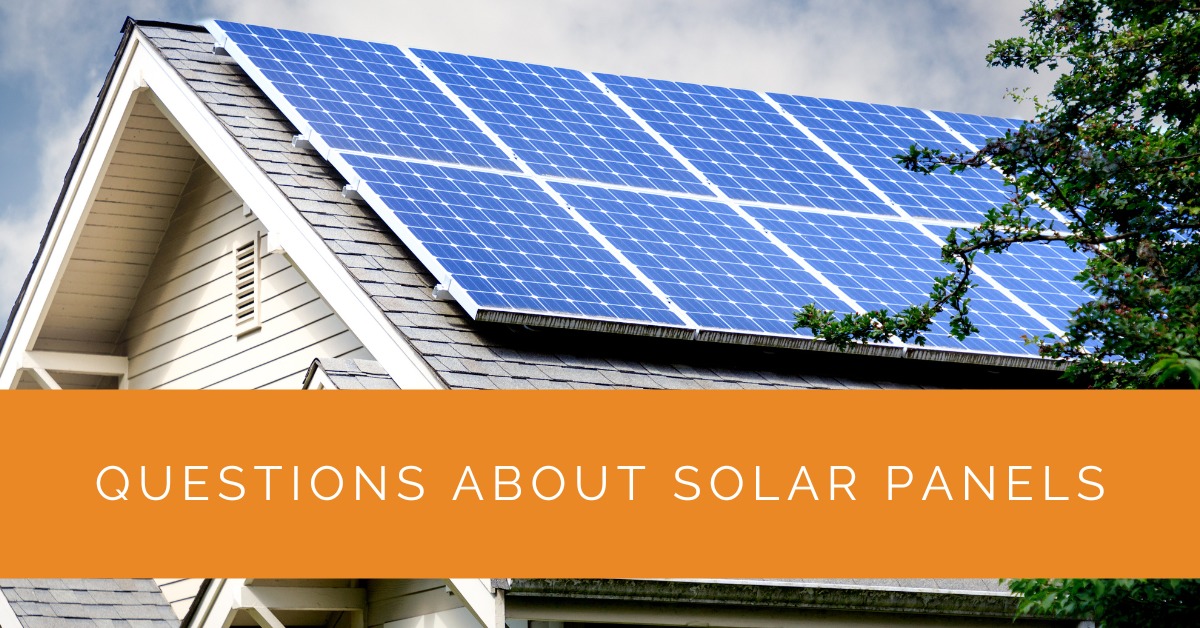With the increasing popularity of solar energy, many people have questions about solar panels and their benefits. In this article, we will address common questions and provide detailed explanations to help you make informed decisions about going solar.
Contents
- 1 How Do Solar Panels Work?
- 2 How Does Solar Power Work?
- 3 What Are the Benefits of Solar Panels?
- 4 How Much Do Solar Panels Cost?
- 5 How Can I Finance Solar Panels?
- 6 How Do Solar Panels Impact Savings?
- 7 Is My Home Suitable for Solar Panels?
- 8 Expert Insights From Our Solar Panel Installers About Solar Panels
- 9 Experience Solar Excellence with Us!
- 10 Conclusion
How Do Solar Panels Work?
Solar panels play a crucial role in converting sunlight into usable electricity. Understanding how they work is essential to grasp the power of solar energy and its applications.
Solar panels operate through the following process:
- Photovoltaic Effect: Solar panels utilize the photovoltaic effect, which is the ability of certain materials to convert sunlight into electricity. This effect is made possible by using solar cells within the panels.
- Solar Cells: Solar cells, typically made of semiconductor materials such as silicon, contain two layers: a positively charged layer and a negatively charged layer. When sunlight hits the solar cells, it excites the electrons, causing them to move from the negatively charged layer to the positively charged layer, creating an electric current.
- Direct Current (DC): The electric current produced by solar cells is direct current (DC), a one-way electricity flow. However, most homes and businesses use alternating current (AC) for electrical appliances.
- Inverter: An inverter is used to convert the DC electricity generated by the solar panels into AC electricity. The inverter’s primary function is to change the current from DC to AC, making it compatible with the electrical grid and suitable for powering household appliances.
- Electrical Panel: The converted AC electricity flows through the electrical panel of your home or business, allowing you to use solar power to meet your energy needs.
Understanding the intricacies of solar panels work enables us to appreciate their efficiency and impact in harnessing clean and renewable solar energy.
How Does Solar Power Work?
Solar power is a clean and renewable energy source that derives its energy from the sun. Understanding the process of solar power generation helps us grasp the potential and benefits of solar energy.
The journey of solar power generation begins with these steps:
- Sunlight: The sun emits energy in the form of sunlight, a mixture of different wavelengths, including visible light, ultraviolet (UV) light, and infrared (IR) radiation.
- Solar Panels: Solar panels comprising numerous solar cells capture sunlight and convert it into electricity. Each solar cell generates a small amount of electrical current when exposed to sunlight.
- Solar Inverter: The generated electrical current, which is in the form of DC, is then passed through a solar inverter. The inverter’s role is to convert the DC electricity into AC electricity, compatible with the electrical grid and appliances used in homes and businesses.
- Electrical Grid: The AC electricity produced by solar panels can be used directly to power appliances in your home. Any excess electricity not immediately consumed is fed back into the electrical grid, allowing you to earn credits through net metering or feed-in tariffs, depending on your location.
- Powering Your Home: The AC electricity from the solar panels and the grid powers your home’s electrical system. The electrical energy flows through your electrical panel, distributing power to your lights, appliances, and other electrical devices.
By harnessing solar power, we can reduce our reliance on fossil fuels, decrease greenhouse gas emissions, and contribute to a cleaner and more sustainable future.

What Are the Benefits of Solar Panels?
Solar panels offer many benefits, making them an attractive choice for homeowners and businesses. Let’s explore some of the key advantages of installing solar panels:
- Reduced Energy Costs: One of the most significant benefits of solar panels is the potential for significant energy cost savings. By generating your electricity from solar power, you can reduce or eliminate your dependence on grid electricity, resulting in lower monthly energy bills.
- Environmental Sustainability: Solar panels provide clean and renewable energy, helping to reduce greenhouse gas emissions and combat climate change. By switching to solar power, you contribute to a greener and more sustainable future for our planet.
- Long-Term Financial Returns: Investing in solar panels can offer long-term financial returns. While the initial investment cost may be a consideration, the savings generated over the lifespan of the solar panels can outweigh the upfront expenses. Additionally, various financial incentives, such as tax credits, rebates, and renewable energy certificates, can help offset the initial investment and accelerate the return on investment.
- Energy Independence: By generating electricity, you gain energy independence and reduce reliance on traditional energy sources. This can provide peace of mind during power outages or when energy prices fluctuate.
- Increased Property Value: Solar panels can increase the value of your property. Many homebuyers are increasingly interested in properties with renewable energy systems, including solar panels. The addition of solar panels can make your property more attractive to potential buyers and may fetch a higher selling price.
Embracing solar panels offers immediate benefits and contributes to a sustainable and eco-friendly lifestyle while positively impacting the environment and your financial well-being.
How Much Do Solar Panels Cost?
Understanding the costs involved in solar panels is crucial for planning and decision-making. The cost of solar panels can vary depending on several factors:
- System Size: The size of the solar system you require depends on your energy needs and the available roof space for installation. Larger systems will generally have a higher upfront cost.
- Equipment Quality: The quality of the solar panels, inverters, mounting systems, and other components affects the cost. Higher-quality equipment may have a higher price tag but often comes with longer warranties and better performance.
- Installation Complexity: The complexity of the installation, including factors such as roof type, angle, and accessibility, can impact the overall cost.
- Additional Features: Optional features such as solar battery storage or solar monitoring systems can increase the overall cost of the installation.
- Incentives and Tax Credits: The availability of local, state, or federal incentives, such as tax credits or rebates, can significantly reduce the upfront cost. These incentives vary based on location and time, so it’s important to research and consult with a solar installer to determine the applicable incentives.
While the upfront cost of solar panels may seem significant, it’s important to consider the long-term financial benefits, such as energy bill savings and potential incentives. Many homeowners find that the return on investment over the system’s lifespan makes solar panels a wise and financially sound choice.

How Can I Finance Solar Panels?
Solar panels can be a substantial investment, but numerous financing options can help make them more affordable. Here are some common methods for financing solar panel installations:
- Solar Loans: Solar loans allow you to borrow the upfront cost of your solar energy system and repay it over time. These loans are designed for solar installations and typically offer competitive interest rates. With a solar loan, you can own the system and benefit from energy cost savings and incentives.
- Solar Leases: A solar lease is an arrangement where a third party owns and installs the solar panels on your property. In exchange, you pay a fixed monthly amount to lease and use the solar panels. While you don’t own the system, you can still benefit from reduced energy bills.
- Power Purchase Agreements (PPAs): A Power Purchase Agreement (PPA) is similar to a solar lease, but instead of paying a fixed monthly amount, you pay for the energy generated by the solar panels at a predetermined rate. With a PPA, a third-party provider owns and maintains the solar panels, and you purchase the electricity produced by the system at a set price, usually lower than the local utility rates. PPAs are a popular option for those who want to benefit from solar energy without the upfront costs and maintenance responsibilities.
- Solar Cash Purchase: Another option is to purchase solar panels outright with cash. Paying upfront for the system eliminates the need for monthly payments or financing, and you can enjoy the maximum financial benefits and savings from the start. While it may require a larger initial investment, owning the solar panels outright allows you to maximize long-term savings and take advantage of available tax credits and incentives.
- Solar Financing Programs: Some solar installers offer financing programs tailored specifically for solar panel installations. These programs may include low-interest loans, deferred payment options, or special promotions. Research and compare the financing programs available to find one that best suits your financial situation and goals.
When considering solar panel financing, evaluating the terms, interest rates, and repayment options is crucial. Calculate the overall costs, including interest charges, and compare them to the estimated energy bill savings over the system’s life. Consult with a reputable solar installer or financial advisor to determine financing options that align with your financial goals and preferences.
How Do Solar Panels Impact Savings?
Solar panels can have a significant impact on your savings over time. Understanding how they affect your energy bills and overall financial situation is essential. Here are some key factors to consider:
- Reduced Energy Bills: Solar panels generate electricity from the sun, which can offset a significant portion of your energy consumption from the grid. As a result, you can reduce or even eliminate your monthly electricity bills, depending on the size of your solar system and your energy usage patterns. The savings will depend on system size, energy consumption, and local electricity rates.
- Net Metering: Many utility companies offer net metering programs, allowing you to receive credits for excess solar energy produced by your panels. When your solar system generates more electricity than you consume, the excess is fed back into the grid, and you receive credits that offset future energy consumption. Net metering reduces or eliminates your electricity bill, further enhancing your savings.
- Long-Term Return on Investment: Solar panels require an initial investment but offer long-term financial benefits. Over time, the savings on your energy bills can offset the upfront costs, resulting in a positive return on investment (ROI). Solar panels have a lifespan of 25 years or more. During that time, you can enjoy reduced or eliminated energy bills, resulting in substantial savings over the system’s life.
- Tax Credits and Incentives: Federal, state, and local governments often provide tax credits, rebates, or other financial incentives to promote solar energy adoption. These incentives can significantly reduce the overall cost of installing solar panels and improve your financial returns. Research the available incentives in your area and consult with a solar installer to ensure you take full advantage of all available programs.
- Future Energy Cost Stability: By investing in solar panels, you gain energy cost stability. Unlike traditional energy sources subject to price fluctuations, solar energy is a free and renewable resource. You become less vulnerable to rising electricity rates by generating your electricity, providing peace of mind and long-term savings.
It’s important to note that the specific impact on savings will vary depending on factors such as system size, location, energy usage, and local policies. Consulting with a solar installer or financial advisor can help you analyze your energy needs, estimate potential savings, and understand the financial implications of installing solar panels.

Is My Home Suitable for Solar Panels?
Determining the suitability of your home for solar panel installation is crucial to ensure optimal energy production and system performance. Here are some factors to consider:
- Roof Orientation and Angle: Ideally, your roof should face south, southeast, or southwest to maximize solar energy production. A roof pitching between 30 and 45 degrees is often ideal for solar panel installation. However, solar panels can still be effective on roofs with other orientations and angles as long as they receive sufficient sunlight throughout the day.
- Shading: Shading from nearby trees, buildings, or obstructions can impact the efficiency of solar panels. Assess your property for potential shading issues, especially during peak sunlight hours. If shading is a concern, you may need to trim trees or adjust the panel placement to optimize sunlight exposure.
- Roof Condition: Solar panels typically have a lifespan of 25 years or more. Ensure that your roof is in good condition and can support the weight of the solar panels. If your roof requires repair or replacement shortly, addressing those issues before installing solar panels is recommended.
- Available Roof Space: The size of your solar panel system will depend on the open roof space. Consider the total square footage of your roof and any obstructions, such as vents or chimneys that may limit the usable area. Solar installers can assess your roof and provide recommendations on the optimal size and configuration of the solar panel system.
- Local Regulations and HOA Restrictions: Check with your local authorities and homeowner’s association (HOA) to ensure no restrictions or permits are required for installing solar panels. Some neighborhoods may have specific guidelines or aesthetic requirements that must be considered.
- Climate and Sunlight Availability: Solar panels can generate electricity even in cloudy conditions, but they are most effective in regions with abundant sunlight. Assess the solar resource potential in your area by considering factors such as average sunlight hours, weather patterns, and any local shading issues.
- Energy Consumption and Goals: Evaluate your energy needs and goals when considering solar panel installation. Review your electricity bills to understand your average monthly consumption and determine how much of your energy usage you want to offset with solar power. This information will help determine the appropriate system size for your needs.
To determine if your home is suitable for solar panels, it’s recommended to consult with a reputable solar installer. They can thoroughly assess your property, including shade analysis, roof condition evaluation, and energy consumption analysis. Based on their findings, they can provide expert advice on the feasibility of installing solar panels and recommend the most suitable system size and configuration for your specific needs.
Expert Insights From Our Solar Panel Installers About Solar Panels
Understanding how solar panels work is essential for anyone considering solar energy. They convert sunlight into electricity through the photovoltaic effect, which is fascinating and crucial for harnessing renewable energy efficiently.
Senior Solar Installer
Choosing the right solar panels can make a significant difference in both performance and cost-effectiveness. It’s important to consider factors such as panel efficiency, durability, and the specific needs of your home or business to ensure you get the best value.
Lead Solar Technician
Financing options for solar panels have evolved significantly, making solar energy more accessible. From solar loans to power purchase agreements, there are numerous ways to invest in solar without a large upfront cost, allowing more people to enjoy the benefits of clean energy.
Solar System Specialist
Experience Solar Excellence with Us!
Trust in Solar Panels Network USA, where our seasoned experts deliver top-quality solar solutions for homes and businesses nationwide. With a legacy of countless successful installations and a commitment to sustainable energy, we’re your reliable partner in the solar journey. Ready for a brighter, eco-friendly future? Call us now at (855) 427-0058 and harness the power of the sun!
Conclusion
Understanding the workings of solar panels, the process of solar power generation, the benefits and costs associated with solar panels, financing options, savings potential, and the suitability of your home for solar panel installation are crucial aspects to consider when exploring solar energy. By addressing these frequently asked questions, we hope to provide you with the knowledge and insights to make informed decisions about going solar. Consult with a reputable solar installer to evaluate your specific requirements and take advantage of solar panels’ benefits, including clean and renewable energy, financial savings, and a reduced environmental impact. Embrace the power of the sun and contribute to a sustainable future.
About the Author
Solar Panels Network USA stands at the forefront of solar energy solutions, driven by a team of seasoned solar engineers and energy consultants. With over decades of experience in delivering high-quality solar installations and maintenance, we are committed to promoting sustainable energy through customer-centric, tailored solutions. Our articles reflect this commitment, crafted collaboratively by experts to provide accurate, up-to-date insights into solar technology, ensuring our readers are well-informed and empowered in their solar energy decisions.

